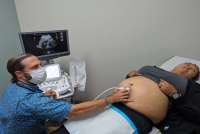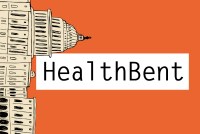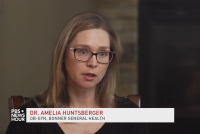Latest KFF Health News Stories
In Wisconsin, Women’s Health Care Is Constricted by an 1849 Law. These Doctors Are Aghast.
From the front lines of Wisconsin’s abortion battle, obstetricians describe patients who cannot comprehend having to carry nonviable pregnancies. And only one pharmacist in town can be found who will fill prescriptions for abortion pills.
Doctors Created a Primary Care Clinic as Their Former Hospital Struggled
With the community’s help, former co-workers came together to fill gaps in care left by the loss of doctors and departments at a Gallup, New Mexico, hospital.
What the Health? From KFF Health News: Let’s Talk About the Weather
It’s been the summer of broken weather records around the world — for heat, rain, and wildfire smoke — advertising the risks of climate change in a big way. But, apparently, it’s not enough to break the logjam in Washington over how to address the growing climate crisis. Meanwhile, in Texas, women who were unable to get care for pregnancy complications took their stories to court, and Congress gears up to — maybe — do something about prescription drug prices. Alice Miranda Ollstein of Politico, Shefali Luthra of The 19th, and Rachel Cohrs of Stat join Julie Rovner, KFF Health News’ chief Washington correspondent, to discuss these issues and more. Also this week, Rovner interviews Meena Seshamani, the top administrator for the federal Medicare program.
What the Health? From KFF Health News: The Long Road to Reining In Short-Term Plans
President Biden made good on a campaign promise this week with a proposal that would limit short-term health insurance plans that boast low premiums but also few benefits. Meanwhile, the Supreme Court’s decision to outlaw affirmative action programs could set back efforts to diversify the nation’s medical workforce. Alice Miranda Ollstein of Politico, Amy Goldstein of the Washington Post, and Rachel Cohrs of Stat News join KFF Health News’ chief Washington correspondent Julie Rovner to discuss these issues and more. Also this week, Rovner interviews KFF Health News’ Bram Sable-Smith, who reported the latest KFF Health News-NPR “Bill of the Month” about how a hospital couldn’t track down a patient, but a debt collector could.
With More People Giving Birth at Home, Montana Passed a Pair of Laws to Make It Easier
The state now requires Medicaid to cover midwife services and has expanded the list of prescription drugs midwives can administer.
Idaho Drops Panel Investigating Pregnancy-Related Deaths as US Maternal Mortality Surges
Amid a years-long rise in maternal mortality rates in the United States, Idaho lawmakers decided to disband a committee created to investigate pregnancy-related deaths.
A New Law Is Supposed to Protect Pregnant Workers — But What If We Don’t Know How?
During pregnancy, workers often face hazardous circumstances, including breathing toxic chemicals. On June 27, the Pregnant Workers Fairness Act began requiring employers to provide “reasonable accommodations.” But the new law has a big hole: Not nearly enough is known about which chemical exposures are dangerous for pregnant workers.
More States OK Postpartum Medicaid Coverage Beyond Two Months
Montana, Alaska, Mississippi, Missouri, South Dakota, Texas, Utah, and Wyoming are among the latest states moving to provide health coverage for up to a year after pregnancy through the federal-state health insurance program for low-income people.
Abortion Bans Are Driving Off Doctors and Closing Clinics, Putting Basic Health Care at Risk
Doctors say they are reluctant to practice in abortion-banned states, where making the best decision for a patient could run afoul of the law. Even former President Donald Trump’s surgeon general is concerned about the repercussions for women’s health, writes KFF Health News’ chief Washington correspondent, Julie Rovner.
A Striking Gap Between Deaths of Black and White Babies Plagues the South
Infant mortality rates across the South are by far the worst in the U.S. A look at South Carolina — where multimillion-dollar programs aimed at improving rates over the past 10 years have failed to move the needle — drives home the challenge of finding solutions, especially in rural communities.
New Mexico Program to Reduce Maternity Care Deserts in Rural Areas Fights for Survival
A federally funded program in remote New Mexico has helped hundreds of pregnant mothers stay healthy, but it’s running out of time and money despite a growing national maternity care crisis. The four-year, nearly $3 million grant has provided telehealth, coordinated care, and social services to mothers in need.
Drive-Thru Baby Showers Serve Express Needs of Pregnant Veterans in Atlanta
Women are the fastest-growing group among U.S. veterans. The Department of Veterans Affairs says it is working to meet their health needs, including pregnancy care.
After Idaho’s Strict Abortion Ban, OB-GYNs Stage a Quick Exodus
At least two Idaho hospitals are ending labor and delivery services, with one citing the state’s “legal and political climate” and noting that “recruiting replacements will be extraordinarily difficult” as doctors leave.
Expectant Mom Needed $15,000 Overnight to Save Her Twins
Doctors rushed a pregnant woman to a surgeon who charged thousands upfront just to see her. The case reveals a gap in medical billing protections for those with rare, specialized conditions.
In Texas, Medicaid Coverage Ends Soon After Childbirth. Will Lawmakers Allow More Time?
Pregnancy-related Medicaid coverage ends just two months after childbirth in Texas — some advocates and researchers say that cutoff contributes to maternal deaths and illnesses in the state.
Estados Unidos sigue siendo uno de los países con más partos prematuros. ¿Se puede solucionar?
Aproximadamente uno de cada 10 nacimientos vivos en 2021 ocurrió antes de las 37 semanas de gestación, según un informe de March of Dimes publicado en 2022. En comparación, investigaciones recientes citan tasas de nacimientos prematuros del 7,4% en Inglaterra y Gales, del 6% en Francia y del 5,8% en Suecia.
The US Remains a Grim Leader in Preterm Births. Why? And Can We Fix It?
American women are more likely to deliver their babies prematurely than women in most developed countries. It’s a distinction that coincides with high rates of maternal and infant death, billions of dollars in costs, and even lifelong disabilities for the children who survive.
California’s Massive Medicaid Program Works for Some, but Fails Many Others
Medi-Cal serves more than one-third of the state’s population — offering a dizzying range of care to a diverse population. In the new “Faces of Medi-Cal” series, California Healthline will assess the program’s strengths and weaknesses through the lives and experiences of its enrollees.
Republican Lawmakers Shy Away From Changing Montana’s Constitutional Right to Abortion
Lawmakers in 14 states have passed near-total bans on abortion since the U.S. Supreme Court overturned Roe v. Wade. But in some conservative-led states where court rulings determined their constitutions protect abortion, including Montana, politicians haven’t asked voters to weigh in.
Watch: In Insurers’ Eyes, Not All Midwives Are Equal
The first installment of InvestigateTV and KHN’s “Costly Care” series explores one California mother’s experience struggling to get reimbursed for midwifery care and the differences between providers that may determine whether insurance covers them.
























